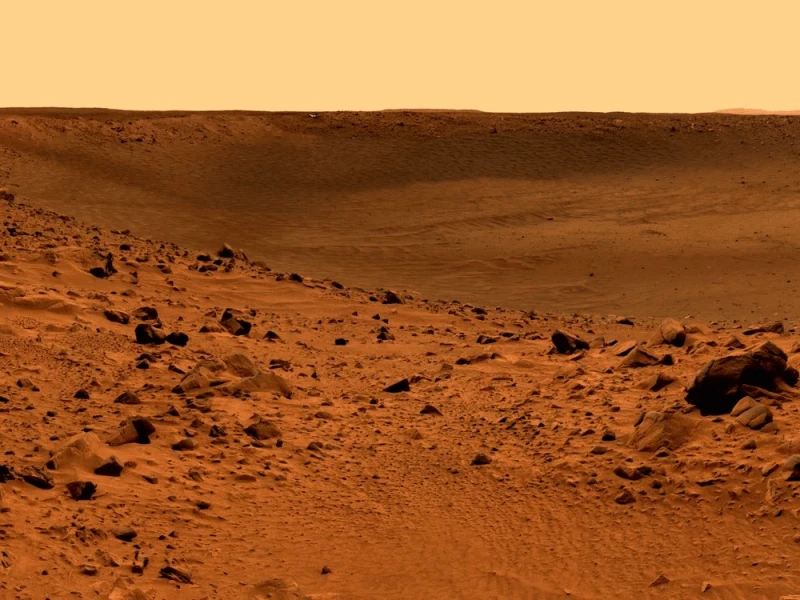Terraforming Mars? How cultivating symbiotic soil bacteria could transform ‘inhospitable’ Martian dust into fertile soil
Terraforming Mars? How cultivating symbiotic soil bacteria could transform ‘inhospitable’ Martian dust into fertile soil


Martian soil differs significantly from Earth’s—it lacks essential nutrients, contains perchlorates (a toxic chemical), and is highly alkaline. These factors make it inhospitable for most plant life.
So, how might human explorers support themselves on Mars? It turns out, an ancient agricultural strategy pioneered by Mayan civilization farmers may come to their rescue.
This approach, known as intercropping, is still in practice and entails growing two to three different types of crops together. This strategy is advantageous because it produces plants with complementary traits that can help each other survive.
The study team [at Wageningen University & Research] reportedly added beneficial microorganisms and nutrients. They also adjusted the greenhouse’s gases, temperature, and humidity to simulate Martian greenhouse conditions.
Remarkably, tomatoes grown in this intercropping method doubled their yield compared to monocropped plants in the same simulated Martian soil. Tomato plants also exhibited early flowering, accelerated maturation, increased fruit production per plant, and thicker stems. However, intercropping did not result in increased yields for peas and carrots.
…
The team postulates that tomato plants performed better in intercropping due to the presence of pea plants, which can fix nitrogen from the air with the help of symbiotic bacteria called rhizobia.
This is an excerpt. Read the original post here

 | Videos | More... |

Video: Nuclear energy will destroy us? Global warming is an existential threat? Chemicals are massacring bees? Donate to the Green Industrial Complex!
 | Bees & Pollinators | More... |

GLP podcast: Science journalism is a mess. Here’s how to fix it

Mosquito massacre: Can we safely tackle malaria with a CRISPR gene drive?

Are we facing an ‘Insect Apocalypse’ caused by ‘intensive, industrial’ farming and agricultural chemicals? The media say yes; Science says ‘no’
 | Infographics | More... |

Infographic: Global regulatory and health research agencies on whether glyphosate causes cancer
 | GMO FAQs | More... |

Why is there controversy over GMO foods but not GMO drugs?

How are GMOs labeled around the world?

How does genetic engineering differ from conventional breeding?
 | GLP Profiles | More... |

Alex Jones: Right-wing conspiracy theorist stokes fear of GMOs, pesticides to sell ‘health supplements’




 Viewpoint — Fact checking MAHA mythmakers: How wellness influencers and RFK, Jr. undermine American science and health
Viewpoint — Fact checking MAHA mythmakers: How wellness influencers and RFK, Jr. undermine American science and health Viewpoint: Video — Big Solar is gobbling up productive agricultural land and hurting farmers yet providing little energy or sustainabilty gains
Viewpoint: Video — Big Solar is gobbling up productive agricultural land and hurting farmers yet providing little energy or sustainabilty gains Fighting deforestation with CO2: Biotechnology breakthrough creates sustainable palm oil alternative for cosmetics
Fighting deforestation with CO2: Biotechnology breakthrough creates sustainable palm oil alternative for cosmetics Trust issues: What happens when therapists use ChatGPT?
Trust issues: What happens when therapists use ChatGPT? 30-year-old tomato line shows genetic resistance to devastating virus
30-year-old tomato line shows genetic resistance to devastating virus California, Washington, Oregon forge immunization alliance to safeguard vaccine access against federal undermining
California, Washington, Oregon forge immunization alliance to safeguard vaccine access against federal undermining The free-range chicken dilemma: Better for birds, but with substantial costs
The free-range chicken dilemma: Better for birds, but with substantial costs ‘You have to treat the brain first’: Rethinking chronic pain with Sanjay Gupta
‘You have to treat the brain first’: Rethinking chronic pain with Sanjay Gupta
